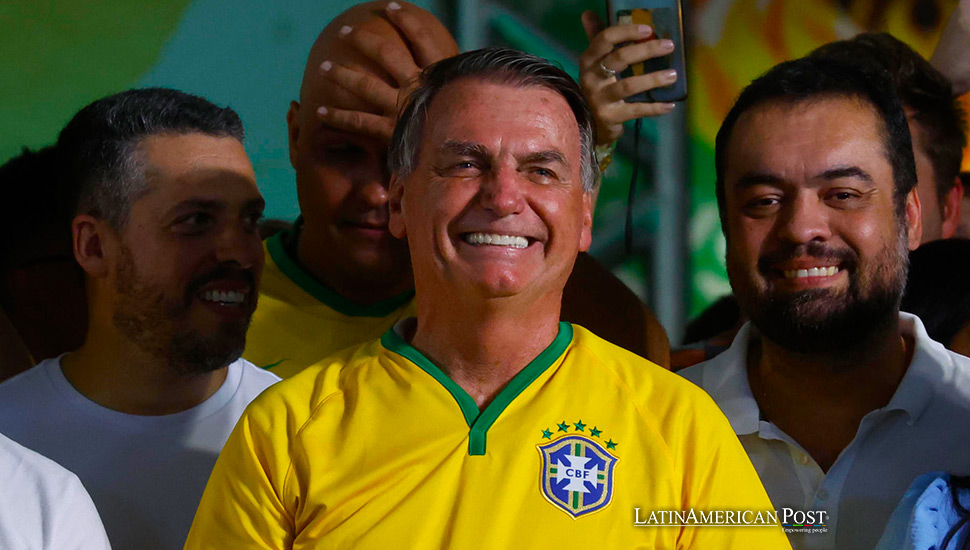Brazil’s Bolsonaro Becomes a Major Figure of Division as Elections Loom

Jair Bolsonaro, Brazil’s firebrand president, casts a long shadow over the nation as it gears up for a crucial election in October 2024. His presidency has been marked by controversy, with his far-right views, handling of the COVID-19 pandemic, and environmental policies sparking fierce debate and social division.
Bolsonaro’s rise to power in 2018 capitalized on anti-establishment sentiment. His supporters hail him as an outsider, untainted by the corruption scandals that plagued previous administrations. They admire his tough-on-crime stance and his promise to restore traditional values.
However, Bolsonaro’s critics paint a different picture. They see him as a divisive figure who has eroded democratic institutions and emboldened extremist elements within Brazilian society. His handling of the COVID-19 pandemic, downplaying its severity and promoting unproven treatments, has been widely criticized. Environmentalists decry his dismantling of environmental protections in favor of agribusiness interests, leading to a surge in deforestation of the Amazon rainforest.
The Looming Election: Stakes Run High
The upcoming election will be a pivotal moment for Brazil. Bolsonaro is seeking re-election, facing a diverse field of challengers who represent a spectrum of political views. The outcome will determine the nation’s future trajectory—whether it continues Bolsonaro’s policies or shifts towards a more moderate and environmentally conscious direction.
Despite the controversies, Bolsonaro retains a loyal base of support. His supporters, concentrated in rural areas and among conservative Christians, admire his unwavering stance on issues like gun rights and family values. They believe his policies prioritize national interests and counter traditional political elites perceived as out of touch with ordinary Brazilians.
Challenges for Bolsonaro
However, Bolsonaro also faces significant headwinds. The economic recovery from the pandemic has been slow and uneven, with millions of Brazilians struggling with inflation and rising unemployment. His handling of COVID-19 has left a lasting scar, with many Brazilians holding him accountable for the high death toll. Furthermore, his constant attacks on the judiciary and democratic institutions have alienated some moderate voters.
A key challenger to Bolsonaro is the former president, Luiz Inácio Lula da Silva, popularly known as Lula. Lula, a left-wing leader, served two terms as president from 2003 to 2010. His presidency coincided with a period of economic growth and reduced poverty. He remains a popular figure, particularly among the working class, who benefitted from his social programs.
However, Lula’s legacy is also tarnished by corruption scandals that marred the Workers’ Party (PT) he belongs to. He was convicted of corruption charges in 2017 but later released after the convictions were overturned on technicalities. This legal saga continues to cast a shadow over his candidacy.
Beyond Lula: A Diverse Field of Candidates
Other potential challengers include Ciro Gomes, a center-left politician, and João Doria, a center-right governor with a strong business background. The fragmented opposition faces the challenge of uniting to defeat Bolsonaro, a formidable campaigner with a knack for tapping into populist sentiment.
The future of the Amazon rainforest will be a defining issue in the election. Bolsonaro’s policies have encouraged illegal loggers and miners, leading to a surge in deforestation. This has caused international outrage and threatens the environmental sustainability of one of the world’s most vital ecosystems. Lula and other challengers have pledged to reverse these policies and prioritize environmental protection.
The Role of Social Media
Social media will play a crucial role in shaping the election narrative. Bolsonaro is a social media master, using platforms like Twitter to bypass mainstream media and directly communicate with his supporters. His opponents must find effective ways to counter his disinformation campaigns and reach out to voters disillusioned with the political establishment.
The outcome of the 2024 election in Brazil remains highly uncertain. The country is deeply divided, and the stakes are high. The result will determine whether Brazil continues down a path of populism and environmental degradation or embarks on a course correction toward a more democratic and sustainable future.
Looking Beyond the Election: Challenges and Opportunities
Regardless of the election outcome, Brazil faces significant challenges. The nation needs to address inequality, corruption, and a sluggish economy. Bridging the deep social and political divides is crucial for the country’s long-term stability.
However, Brazil also boasts immense potential. Its vast natural resources, dynamic population, and growing middle class could propel the country toward greater prosperity. The key will be finding a leadership that effectively harnesses these strengths while addressing the pressing needs of the population.
Also read: Brazilian Left-Wing Tax Policies Are Inadequate Solutions for Economic Growth
The outcome of Brazil’s election matters for Brazilians, the entire region, and the world. Brazil is the largest economy in Latin America and a significant player on the global stage. Its policies on issues like climate change and trade have far-reaching implications. The world will watch closely as Brazil navigates this pivotal historical moment.





